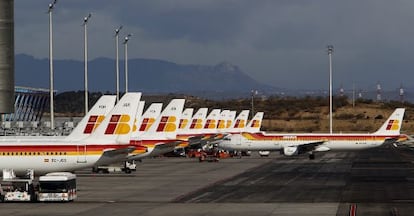Putting Spain’s flag carrier back on course
Iberia’s management says its restructuring program will see the troubled airline return to profit in 2014, after five years of losses

There are few souls to be found at Iberia's former headquarters in Madrid's smart Salamanca district. The offices have been emptied of desks and computers, and just a skeleton staff remains to oversee the final stage of their move to a nearby office tower. It's a newer building, but it's also cheaper. The move is part of an overall restructuring to cut costs at the Spanish flag carrier, which has also seen routes cut, staff laid off, and salaries further reduced. The management's goal is to return to profitability in 2014 after five consecutive years of losses.
The question is whether a company that was losing a million euros a day one year ago will be able to implement rapid change so quickly. The restructuring largely depends on lengthy talks with the workforce as part of a plan to lay off 3,141 cabin and ground crew - that's around 15 percent of the total.
Iberia's new management team -- led by Luis Gallego, who took over from Rafael Sánchez-Lozano in March -- has set an end-of-year deadline to reach a long-term agreement with pilots, crew and ground staff. It also wants to expand its low-cost wing, Iberia Express, which was set up in 2012. The latter move is being prevented by the dispute with the pilots, according to the company.
Will a company that was losing a million euros a day be able to change
Last spring, after several years without a pay increase, workers agreed to a 15-percent salary cut. In the third quarter of the year the company's operating income was 74 million euros, up from the one million of the previous year. But these figures reflect the busy summer period: the company's accumulated losses for the year are expected to reach around 200 million euros.
Willie Walsh, the CEO of IAG - BA and Iberia's holding company following the merger three years ago - says that much remains to be done to improve Iberia's profitability. IAG turned in a 77-million-euro profit for the third quarter of this year, up 23 percent on the same period in 2012. He attributes part of that to the purchase of low-cost carrier Vueling. BA has also boosted its performance, and is forecast to make an operating profit of between 1.1 and 1.3 billion euros this year. As a result, IAG's share value has doubled this year.
As for Iberia, its "tactical withdrawal," as Walsh describes it, will go on for some time. The skeptics, such as Xavier Fageda, a lecturer in economics at the University of Barcelona, question whether Iberia can turn a profit by the end of next year.
"A year ago it was losing a million euros a day. I do not believe that it can stop making a loss so quickly." He says that it still needs to drop more routes (it has already stopped flying to Athens, Santo Domingo, Johannesburg and Washington, as well as having transferred most of its domestic routes to Iberia Express).
“If we don’t fix Iberia, we’re dead”

After running the show at Iberia's Air Nostrum, Clickair - which merged with Vueling in 2009 - and Iberia Express, Luis Gallego took over as CEO of Iberia in March. He is tasked with transforming the struggling company, which involves cutting salaries and costs, and increasing flexibility in the hope of boosting productivity at a firm that has been losing money for the last five years. In January, he will take over the president's post.
Question. Iberia's holding company IAG has just unveiled its plans for the future, but it's not clear where Iberia fits into that future...
Answer. There are two scenarios - one in the event that we reach agreement with the workforce. We have looked at likely revenue flow, costs, and the wider economy of Spain, and we see a sustainable future that allows for investment and growth.
Q. Is the other scenario more optimistic?
A. Everything depends on reaching an agreement with the workforce. We want to do so by the end of the year. Based on what we manage to achieve, there will be greater or fewer opportunities for growth and to buy some new aircraft.
Q. Are negotiations with the pilots proving difficult?
A. Talks with all the staff are sensitive. We are asking everybody to make a big effort. We are discussing ways to improve productivity and to keep wages down. New staff will be paid the going rate in the market. The key to the whole thing is Iberia Express.
Q. Does the pilots' opposition to the pay and working conditions in Iberia Express mean the company cannot grow?
A. We set up Iberia Express because we became aware of the damage that the low-cost companies were doing to us. Iberia Express's structure means that it can compete with the low-cost companies, while at the same time feeding Iberia's network. It is a key part of the plan to improve Iberia's financial position, because most of the company's losses are in the short- and medium-haul flights. But the conflict with the pilots is stopping us from growing Iberia Express. If we don't manage to do this, then other low-cost operators will come into Madrid to do the same job. If we don't make a success out of Iberia Express, then Iberia itself is at risk.
Q. How are talks going with Iberia's staff?
A. They are progressing. The problem is that we are asking for measures to change Iberia. This is not about modernization. Iberia has to change, otherwise it dies. Around 70 percent of passengers aboard long-haul flights are connecting with other flights, which means bringing them through Madrid, and we have to bring them in short- and medium-haul aircraft. Analyzing the use of these planes shows that about 20 percent of passengers will connect with long-haul flights, 30 percent with short and medium, and that the rest are point-to-point passengers who have paid a low-cost fair.
Q. Is your goal to turn Iberia into a low-cost company?
A. This isn't about turning Iberia into a low-cost company. It is about being able to compete, which means creating cost and productivity structures similar to our rivals, which are much younger and more dynamic. I think that everybody who works for Iberia is aware of the problem. If we don't fix Iberia, we're dead. You can tell yourself that this is cyclical, that the good times will be back, and that we'll come out of this. But we are drowning, and the water is getting higher.
Q. A lot of people blame the merger with British Airways for Iberia's problems.
A. One thing is what people feel, and another is what has actually happened. When you look at the figures you can see that Iberia was losing money before the merger. While British Airways has undergone two restructuring exercises in the last decade, Iberia has remained untouched. British Airways has reduced its staff from 60,000 people to 35,000, while Iberia has gone from 28,000 to close to 20,000. British Airways reduced capacity, and from that point on it began to grow. Iberia's earnings per route compared to its competitors have nothing to do with the merger.
Q. Has British Airways taken any of Iberia's traffic?
A. Absolutely not. Madrid remains the hub for the majority of passengers travelling from Europe to Latin America. It is true that London has grown since 2009, but not at Iberia's expense. British Airways has taken neither routes nor traffic. Some 65 percent of flights between London and Madrid are Iberia.
"There has been no substantial change structurally. It reminds me of what is happening at Alitalia, where the restructuring is taking a very long time," Fageda says. The Italian flag carrier is on the brink of bankruptcy.
Iberia has been hit by the fall off in traffic through Madrid, and worst of all, by the tough competition posed by the growth of low-cost carriers. The management says that it now has to match them. The problem with reducing its short-haul flights is that they are very important for filling its long-haul routes, because 70 percent of aircraft flying to Latin America no longer leave from Madrid, but instead from Valencia, Rome, London or Stockholm. So for the meantime, the company's remaining short- and long-haul flights will remain loss leaders, dragging the company's results down.
"Being competitive on long-haul means having an efficient network of short- and medium-haul routes to feed the hub in Madrid. This is why Iberia needs to restructure," says Rosario Silva, a lecturer at IE Business School. Not that Iberia needs to become a low-cost airline to do that, she adds. "Until now, Iberia has shown that it has the resources and ability to compete in the long- and medium-haul routes: it has a brand and an efficient route network; it's a member of the Oneworld Alliance; it is located in one of the biggest hubs in the world - Madrid comes 15th in terms of the number of passengers it carries, according to the ACI Worldwide Airport Traffic Report... In other words, it should keep its business model."
As well as the challenge from low-cost carriers such as Ryanair and easyJet, Iberia faces growing competition from Latin American companies such as Lan Chile. Spain's network of (cheaper) high-speed train routes has also lured passengers away. Iberia was the European airline that lost most traffic in October, with a 30-percent drop in flights and an average 210 movements per day, according to EU sources.
On long-haul routes, Iberia has held onto its first place in the Europe-Latin America segment, with a market share of 16 percent, according to the company. Its main rival, Air France, has 12 percent. But SEPLA, Iberia's pilots' union, says the company is losing ground to Air France, and believes that sooner or later, a deal will have to be struck with the French company. It also says that Iberia has effectively ceased to exist following its merger with BA, staff cuts, reduced routes, and, of course, the purchase of Vueling.
"There is nothing left to plunder: the new team has come to restructure Iberia," says Justo Peral of SEPLA. He says that the workforce accepts the need for pay cuts, but that the main issue is Iberia Express: "If we reduced Iberia's salaries to low-cost levels, then why bother with Iberia Express?" The company says that however much the parent company undergoes restructuring, it will never have the flexibility and competitive cost structure of a separate low-cost carrier.
Iberia's cabin and ground staff did not oppose the creation of Iberia Express when it was set up. Manuel Atienza, a spokesman for the airline division of labor union UGT, says that he is particularly concerned about the lack of what he calls an "industrial plan upon which to negotiate cuts."
Atienza says that staff fear for the future of the company, and have no idea what the management's long-term plans are. "We are prepared to make an effort. We all know that the restructuring has to be deepened, particularly in the short- and medium-haul market," he says.
Renewing the company's aircraft is another difficult area. IAG says that Iberia's financial problems prevent the purchase of new planes, given that the basis of the merger with BA is that each company must find its own financing to buy new aircraft. Iberia is introducing the new Airbus A330 into its fleet, having bought eight, with an option to buy a further eight. But many in the company were surprised and disappointed that Iberia was not to benefit from the purchase of 98 planes that will go to BA and Vueling. IAG says that it has secured options for the purchase of up to 44 new planes for Iberia, but that nothing has been signed yet.
Iberia knows that acquiring new planes is not just about keeping up appearances, and that the new generation of aircraft save money through more efficient fuel use. "Once Iberia has sorted out its internal problems, it should continue being a network airline," says Elena Fernández, an analyst of the sector at Ahorro Corporación. "It is true that competition from low-cost companies has been aggressive and that Air Europa has taken advantage of our weaknesses, but once we have a strategy in play, it shouldn't be too difficult for Iberia to recover a lot of the ground it has lost," she adds.
Most of the world's major flag carriers have been undergoing restructuring over the last decade. BA has implemented several programs to improve its profits. In 2002, after the attacks on the World Trade Center hit the airline industry hard, it cut its workforce by 23 percent, shedding some 13,000 jobs, while cutting its capacity by 21 percent. Unprofitable routes between Heathrow and Belfast went, prompting protests in Northern Ireland. In May 2009, after the financial crisis, another adjustment plan was implemented, with a further 3,800 jobs adding to the 2,800 that had been cut in September 2008, while capacity was cut by a further five percent. In 2012, Air France-KLM announced an ambitious restructuring plan that included laying off 5,100 people; a further 2,800 jobs were lost this summer, while some of its activities were transferred to its low-cost affiliate Transavia, and 34 planes sold.
Germany's Lufthansa is currently working on a plan to lay off 3,500 people, which will see it withdraw around 40 of its aircraft, as well as create another low-cost affiliate. It will pass the short- and medium-haul routes that do not include Munich and Frankfurt to its already existing low-cost carrier Germanwings. Scandinavia's SAS and Japan's JAL have already carried out similar restructuring programs. American Airlines is about to merge with US Airways to create the biggest airline in the world.
But it is Italy's flag carrier that most resembles Iberia. "Like Iberia, Alitalia suffers from a combination of unprofitable routes, high salaries, and similar losses in a competitive market, particularly from low-cost companies, but also from the high-speed Milan-Rome train," says Xavier Fageda. "The restructuring in Alitalia began some time ago, but it has been difficult, and there is still an ongoing labor dispute with the workforce," he adds.
Alitalia is on the brink of bankruptcy, and urgently needs around 300 million euros. Its main shareholder, Air France-KLM, has said that it will not come to the company's rescue, arguing that the restructuring process underway, which is based on an as-yet unspecified reduction in capacity, is insufficient. In 2008, Air France-KLM bought 25 percent of Alitalia, rescuing it from collapse. Five years later, the airline remains in the red. It has lost one billion euros since then, including 200 million euros in the first quarter of this year: all this despite measures such as abandoning its Milan hub in favor of Rome, and setting up an alliance with low-cost operator Air One.
The economic crisis of the last five years has hit the European sector hard. "In 2012, Europe's airlines were among the least profitable in the world," says Rosario Silva. "They have seen a slight increase in passenger numbers in the first quarter of 2013, but even so, profitability has fallen," she adds. IATA, the International Air Transport Association, forecasts that the sector's operating margin globally will be around four percent next year, while in Europe the figure will be 1.9 percent. "Traditional airlines are lowering their prices, both because of the economic situation, but also because of competition from low-cost companies, as well as players such as Emirates and Qatar Airways, which are absorbing traffic between Europe and Asia from the European airports to their hubs," she adds.
The overall decline in air traffic in Europe over the last five years adds to Iberia's woes. Demand has plummeted, while the company's reduced capacity has only worsened the situation. "The problem with Barajas is that it is overly dependent on the domestic market, much more so than other airports," says Xavier Fageda. Matters have been made worse by the excess capacity created as a result of building its vast T4 terminal. Other airports, such as Heathrow, do not face this problem: they are working at over-capacity. "I am optimistic about Iberia in the medium term," says Fageda. "When it is restructured, it will increase its capacity, and Barajas will have the advantage over other airports that are saturated."








































